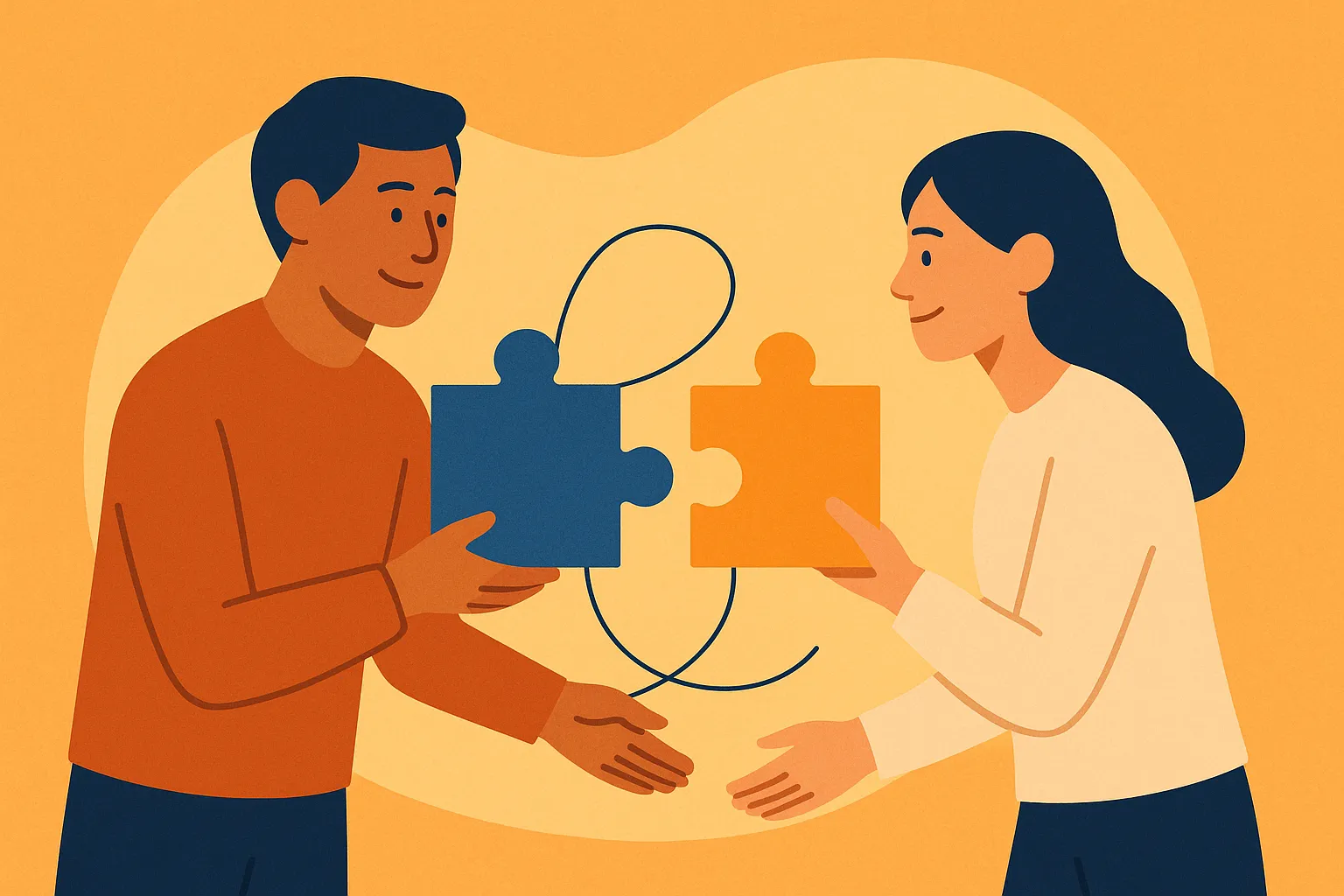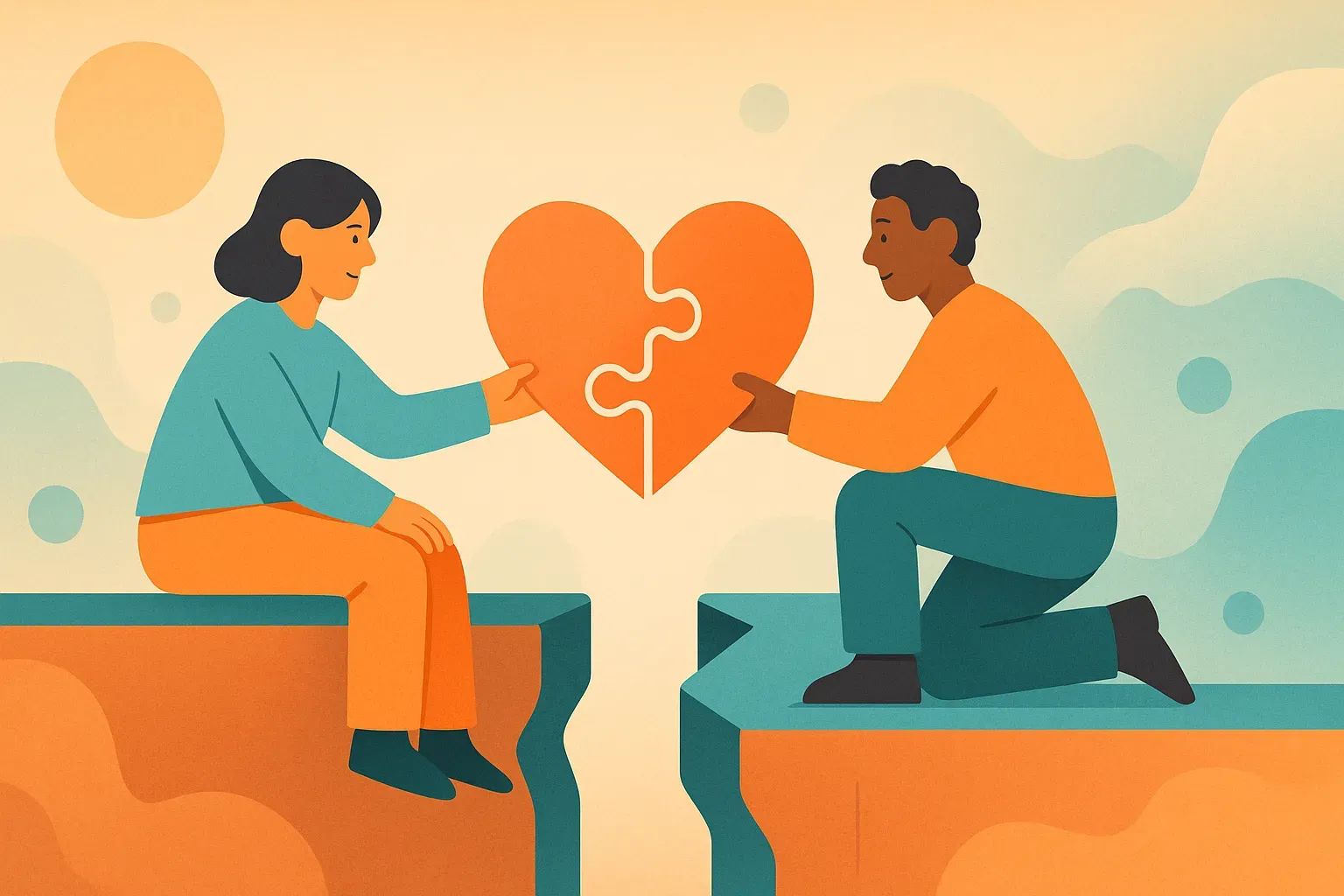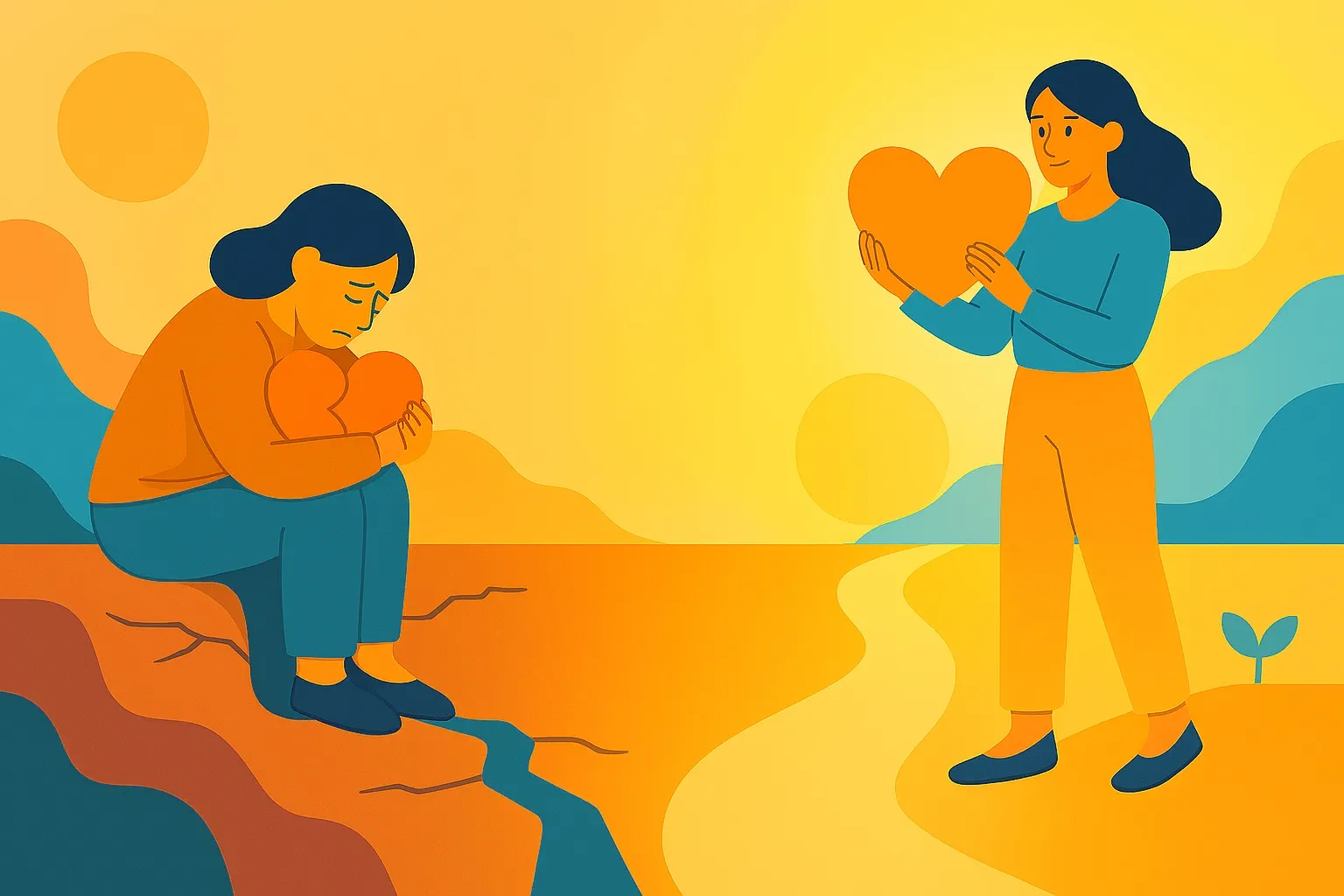
I spent three months convinced I could pull off the "mature ex-friendship" thing. Three months of liking every Instagram post, responding to texts within minutes, and showing up to group hangouts with the emotional stability of a caffeinated hamster.
The breaking point came at Emma's birthday party. There I was, watching my ex laugh at another guy's jokes – the SAME jokes I used to make – and I found myself literally hiding behind a potted plant, stress-eating birthday cake and texting my sister: "Is it normal to feel like your chest is on fire when your 'friend' talks to other people?"
That's when I realized I had turned into that person. You know the one – claiming to want friendship while secretly hoping every casual coffee would turn into a tearful reunion montage. I was a walking contradiction wrapped in false confidence, and honestly? It was exhausting for everyone involved.
The humiliating truth hit me that night: I wasn't ready to be friends with my ex because I wasn't actually over the relationship. I was just really good at lying to myself.
But here's what I learned after months of awkward encounters and emotional whiplash: The question isn't whether you CAN be friends with your ex – it's whether you SHOULD be, and more importantly, WHETHER YOU'RE ACTUALLY READY for what real friendship looks like.
Why Most "Ex-Friendships" Are Built on Hidden Agendas
Here's the uncomfortable reality most people won't admit: when we say we want to be "friends" with an ex, we're often not talking about actual friendship at all.
Real friendship means genuinely celebrating when they find someone new. It means not analyzing every text for hidden meaning. It means being able to hear about their dating life without feeling like someone's playing your heartstrings like a violin.
Most of us? We're nowhere near that level of emotional detachment.
"The biggest mistake people make is confusing attachment with genuine friendship." When we're still emotionally invested in someone romantically, what we call "friendship" often becomes a form of emotional torture disguised as maturity.
I've watched dozens of people – myself included – turn post-breakup "friendship" into an elaborate strategy for staying connected while secretly hoping for reconciliation. We convince ourselves we're being evolved and mature, but really we're just afraid to let go completely.
The result? Months or even years of mixed signals, false hope, and emotional confusion that benefits absolutely no one.
If you're still hoping they'll realize they made a mistake, you're not ready to be their friend. You're ready to be their maybe-someday-partner in disguise.
The Good News: Real Ex-Friendships Do Exist (But They Look Different Than You Think)
I know this sounds discouraging, but here's the thing – genuine friendships with exes ABSOLUTELY CAN work. I have three ex-partners I genuinely consider friends today, and our relationships are healthier now than they ever were when we were dating.
But what nobody tells you is these friendships look nothing like the relationship you used to have, and they definitely don't happen overnight.
What actually works is a completely different approach than what most people try. It's not about seamlessly transitioning from lovers to friends. It's about ending one relationship completely, doing the hard work of healing separately, and then – maybe, eventually – building something entirely new from scratch.
This isn't about quick fixes or keeping someone in your life at any cost. It's about honest self-assessment, healthy boundaries, and accepting that some relationships are meant to end completely – and that's okay too.
The 4-Phase Framework for Healthy Ex-Relationships
Phase 1: The Complete Break (30 Days Minimum)
Stop trying to maintain contact immediately after the breakup.
I know this sounds extreme, especially when you're both claiming you want to "stay friends," but this phase is absolutely non-negotiable. You cannot go from romantic partners to platonic friends without a clean reset period.
📋 During this phase, what must been done are:
- No texting, calling, or social media interaction
- Unfollow or mute them on all platforms (yes, even LinkedIn)
- Avoid places you know they'll be when possible
- Process your emotions without their input or presence
What most people get wrong: They think a few weeks is enough, or they make exceptions for "important" conversations. Every exception restarts your emotional healing clock.
I learned this the hard way when I kept "checking in" on my ex during our "break." What I thought was caring behavior was actually preventing both of us from moving forward. When you're constantly touching base, you never fully detach emotionally.
The goal isn't to punish anyone – it's to create space for genuine healing to happen.
🤔 Not sure if you should really go "this extreme"? Worried about seeming cold, ruining reconciliation chances, or missing something "important"? Click here to let ChatVisor help you figure out exactly what level of contact (or no-contact) is right for your specific situation.
Phase 2: Individual Healing and Self-Assessment (2-3 Months)
Use this time to honestly evaluate your motivations and emotional state.
This is where the real work happens. You need to get brutally honest about why you want this friendship and whether you're emotionally capable of it.
🔑 You need to know the true answers of these questions:
- Can I genuinely celebrate their happiness with someone else?
- Am I hoping friendship will lead to reconciliation?
- Do I feel complete and fulfilled without them in my life?
- Am I pursuing this friendship for healthy reasons or out of fear of loss?
What most people get wrong: They skip the self-reflection and jump straight to trying to reconnect because being apart feels uncomfortable.
During this phase, many people confront uncomfortable truths about their attachment patterns. They realize their desire to "stay friends" is often about avoiding grief rather than genuine friendship. Only after proper healing time can someone truly assess whether they miss their ex platonically or are still holding onto romantic hope.
This distinction is crucial but impossible to make clearly right after a breakup when emotions are too raw.
Phase 3: Careful Re-engagement (If Appropriate)
Reach out only when you can honestly say the friendship would add value to both your lives – not fill a void.
🪜 If you've made it through Phase 2 and still genuinely want a friendship, start with these small things:
- Send a brief, low-pressure message acknowledging the time apart
- Suggest a casual, public meetup with clear boundaries
- Keep initial interactions short and focused on current life updates
- Pay attention to how you feel during and after contact
🚩 Red flags that you're NOT ready:
- Analyzing their response time or tone for hidden meaning
- Feeling anxious or jealous about their dating life
- Hoping the meetup will spark something romantic
- Feeling devastated if they're not interested in friendship
What most people get wrong: They interpret any positive response as encouragement for more intensive contact.
Example on what you can say: "Hope you're doing well. Would love to catch up sometime if you're interested." No emotional processing, no references to our past relationship, no pressure.
🤔 Worried you'll say the wrong thing and ruin any chance of friendship? Afraid you're misreading their responses and setting yourself up for disappointment? Click here to get an AI relationship advisor to help you out!
Phase 4: Building New Boundaries and Expectations
Create a friendship that acknowledges your history without being defined by it.
🔍 If the re-engagement goes well, you'll need to figure these out for the new relationship:
- What topics are off-limits (new relationships, past conflicts, etc.)
- How often you'll communicate and in what contexts
- What level of emotional support is appropriate
- How you'll handle it if romantic feelings resurface
What most people get wrong: They assume the friendship should feel natural immediately and don't establish clear boundaries.
Examples of successful friendship boundaries include: occasional coffee meetups, texting about work or humor, but steering clear of dating discussions or romantic emotional support. While this might feel somewhat formal at first, it often proves to be the foundation that makes the friendship work.
What If …
"But what if I lose them forever?"
This fear is completely understandable, but here's the thing – if the only way to keep someone in your life is by accepting a relationship that makes you miserable or prevents you from moving forward, you've already lost the relationship that matters. True friendship can only exist between two people who choose each other freely, not out of fear or attachment.
"What if they don't want to be friends?"
This is actually valuable information. If someone doesn't want a friendship with you, trying to convince them or staying emotionally attached won't change that. Their decision gives you clarity to invest your emotional energy elsewhere.
"How do I know if my feelings are really gone?"
You'll know because thinking about them with someone else won't make your stomach drop. You'll be able to give them relationship advice without wanting to sabotage it. You'll feel genuinely happy for their successes without wondering "what if that were us?"
What to do next
The truth is, most ex-relationships don't need to become friendships, and that's completely normal. Some relationships are meant to be contained within a specific time in your life, and trying to force them into a different shape often diminishes what they meant originally.
But if you've read this far and still feel like a genuine friendship might be possible, ask yourself this: Are you prepared for this friendship to look nothing like your romantic relationship, and are you okay with the possibility that they might not want any relationship with you at all?
If you can honestly answer yes to both questions, then you might be ready to start Phase 1.
Remember: there's no shame in discovering that friendship isn't right for you with a particular ex. Sometimes the kindest thing you can do for both of you is to let the relationship end completely and focus your energy on building new connections.


